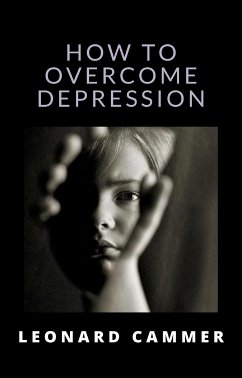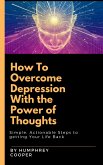- This edition is unique;
- The translation is completely original and was carried out for the Ale. Mar. SAS;
- All rights reserved.
You may want to read this book because one of your family members has entered a crisis. It could be your mother, sister, uncle, or any of the family members, and you may have been wondering for weeks or months what was wrong. Your family member is always far away from everything and everyone, and as you look at him, immersed in his deep melancholy, you get the feeling that life has come to a dead end for him. You may begin to think that you are the cause of this particular mood, that you are somehow to blame. What is happening? Your family member is ill with depression. Yes, ill. Depression is not a mysterious intrusion of gods or demons, it is an illness, just like a heart or lung disorder, or any other illness you can think of. Paradoxically, however, this can be a cause for optimism. Paradoxically, however, this can be cause for optimism. As long as it is an insoluble conundrum you can only derive frustration. Once it becomes a precisely definable illness, it can be dealt with as such. Most depressed people recover, because it is a disorder that can be treated with a very good chance of success. However, there is one condition: that the help of the family should be an integral part of the recovery process. And it was the numerous meetings with many families, the questions and answers given, that provided the material for this book. In the course of this book, the author has aimed at a fundamental goal: to present facts that will enable you to cope with and understand your family member's condition, wherever he or she is treated, during and after treatment, and even before seeking medical advice. Treatment can do a great deal for the depressed person, but you yourself must play a role that is often decisive. If this book succeeds in breaking down the wall of hearsay surrounding depression and in relieving the family of the anguish into which it is thrown when one of its members suffers from this illness, if it can help to bring the depressed person back to a normal life, it will have achieved its aim.
- The translation is completely original and was carried out for the Ale. Mar. SAS;
- All rights reserved.
You may want to read this book because one of your family members has entered a crisis. It could be your mother, sister, uncle, or any of the family members, and you may have been wondering for weeks or months what was wrong. Your family member is always far away from everything and everyone, and as you look at him, immersed in his deep melancholy, you get the feeling that life has come to a dead end for him. You may begin to think that you are the cause of this particular mood, that you are somehow to blame. What is happening? Your family member is ill with depression. Yes, ill. Depression is not a mysterious intrusion of gods or demons, it is an illness, just like a heart or lung disorder, or any other illness you can think of. Paradoxically, however, this can be a cause for optimism. Paradoxically, however, this can be cause for optimism. As long as it is an insoluble conundrum you can only derive frustration. Once it becomes a precisely definable illness, it can be dealt with as such. Most depressed people recover, because it is a disorder that can be treated with a very good chance of success. However, there is one condition: that the help of the family should be an integral part of the recovery process. And it was the numerous meetings with many families, the questions and answers given, that provided the material for this book. In the course of this book, the author has aimed at a fundamental goal: to present facts that will enable you to cope with and understand your family member's condition, wherever he or she is treated, during and after treatment, and even before seeking medical advice. Treatment can do a great deal for the depressed person, but you yourself must play a role that is often decisive. If this book succeeds in breaking down the wall of hearsay surrounding depression and in relieving the family of the anguish into which it is thrown when one of its members suffers from this illness, if it can help to bring the depressed person back to a normal life, it will have achieved its aim.









